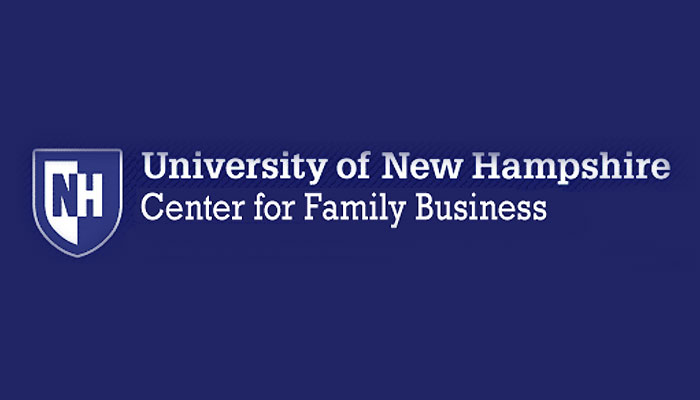All
Nine Traits of a Successful Family Enterprise
by Everett Moitoza, EdD, MBA, Moitoza Consulting and Barbara Draper, Director, University of New Hampshire Center for Family Business

Communicating effectively as a family and a business is essential
The Center for Family Business in the Peter T. Paul School of Business at the University of New Hampshire has recently completed its 22nd year of educating, training and working with family businesses throughout New Hampshire and northern New England. Over the years, many of its program topics have focused on some of the more challenging and problematic aspects of running a successful family business.
Coincidentally, during that time, The Center has also been able to anecdotally identify some of the most positive indicators in family businesses that appear to identify and ensure a healthy family, a prosperous business and a smooth working relationship between the two.
When family firms are healthy in both business practices and family relationships, and they effectively manage the interactions between the two spheres, they can perform superbly in the competitive marketplace.
The ability to combine these major endeavors of work and family life presents a rich opportunity and challenge that is simply unavailable to most working individuals. Family members in well-functioning family firms report that nothing comes close to the depth and joy of family contact, as well as the competitive business advantage and challenges they enjoy in a family-based firm. Moreover, these are the firms that enjoy multiple generations of family succession, as well as prosperous longevity of the business.
Three key areas, each having three particular characteristics, stand out in identifying healthy and successful family businesses. Family enterprises that will live well into the future and enrich the lives of all who participate.
Family Characteristics & Values: This area focuses on the culture, quality and competencies of the family as a separate domestic entity apart from the business.
- Family members have the communicative ability to express and receive each others’ feelings, wants and ideas openly and clearly with an attitude of acceptance for difference. Moreover, “secrets” are absent.
- The family simultaneously encourages and supports individuality and differences in its members both as it pertains to their strengths and weaknesses—especially as it might impact the family business.
- Conflicts and disagreements, within members of the family, are managed with respect and openness. The family is fundamentally focused on achieving “win-win” solutions.
Business Management Skills: This area encompasses the body of professional management knowledge and up-to-date “best practices” as it pertains to the company’s industry.
- Leadership is present and clearly defined. Executives display competence, vision and respect while demonstrating superb communication abilities to all its staff members, vendors and customers.
- Management, business and operational structures, as well as processes and systems are efficient, effective, well documented and regularly scrutinized for improvement, as well as necessity.
- The family enterprise has an active Board of Directors or Advisors comprised of at least two non-family members.
Family /Business Interface: This competency is based on the family’s ability to manage the multiple areas of overlap and interaction that constantly occur between family matters and business practices.
- The family is consistently able to identify when to use criteria that place the family’s needs first and when to use criteria that place the needs of the business first.
- Family members who join the firm must meet the same job qualifications, performance evaluations and compensation standards as non-family employees.
- The family business has created a “Family Council” that meets at least annually and includes all family members, including spouses and those over the age of 16 years. The purpose of this is to build intra-family and business communications and planning. It further assists and prepares family members for possible future positions in joining the business.
In short, families that actively manage their firm using success-based criteria and models versus deficit models are more likely to succeed and prosper
Identifying and developing the core competencies and attributes that predict family and business success and health are imperative. Those family businesses that are the healthiest will survive. The families that can separate family issues from business issues, while professionally managing their organizations, will thrive.
Family enterprises are complicated at best, as are so many fine wines. They require careful management, judicious pruning, and tender loving care. Toward this end, the Center for Family Business (and similar organizations in other states) can be of great support and assistance.
Everett Moitoza can be reached at moitoza@comcast.net. Barbara Draper can be reached at Barbara.Draper@unh.edu.
Related Posts
 The Imperative of Cloud-Based Data Security
The Imperative of Cloud-Based Data Security
Posted on April 17, 2024
 Innovative Financing Solutions for Energy Businesses
Innovative Financing Solutions for Energy Businesses
Posted on March 12, 2024
 Service, Support and Collaboration Separate Payment Partners From a Payment Processor
Service, Support and Collaboration Separate Payment Partners From a Payment Processor
Posted on March 12, 2024
 Heating Things Up: How Influencer Marketing Will Ignite the Oil Heat Industry
Heating Things Up: How Influencer Marketing Will Ignite the Oil Heat Industry
Posted on March 12, 2024
Enter your email to receive important news and article updates.
